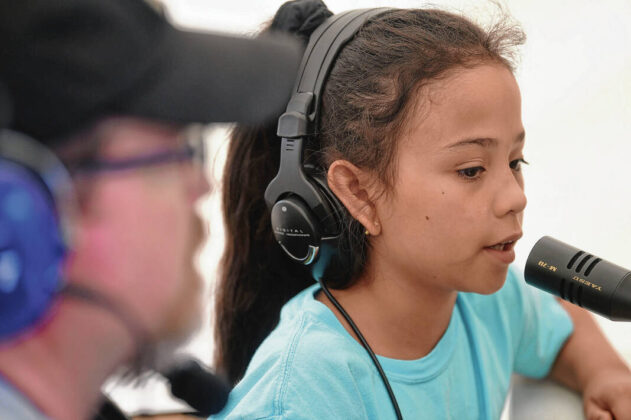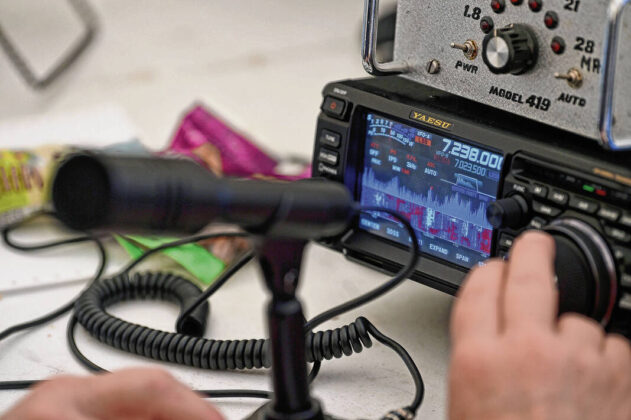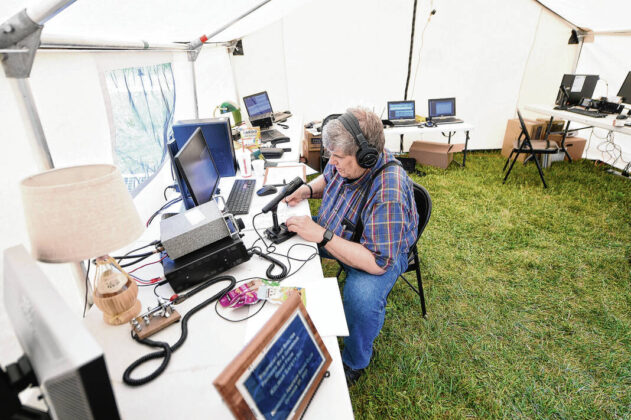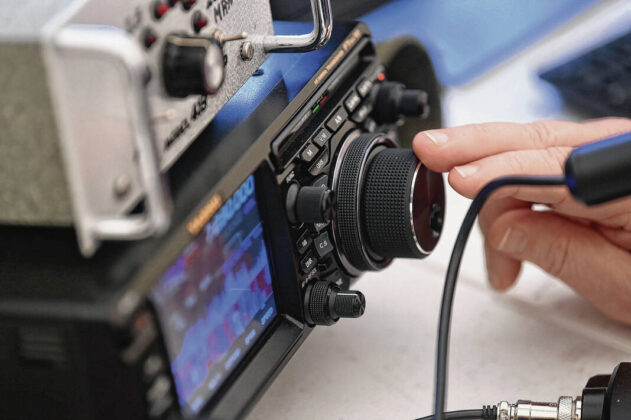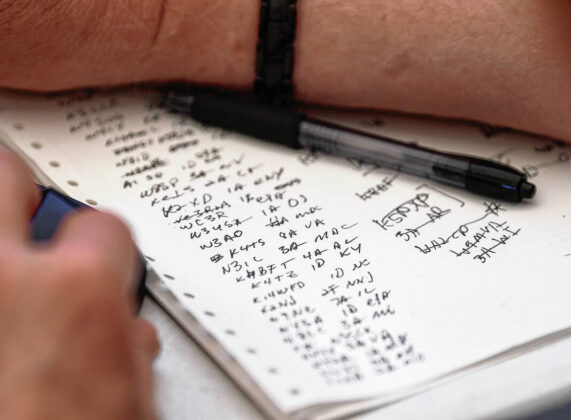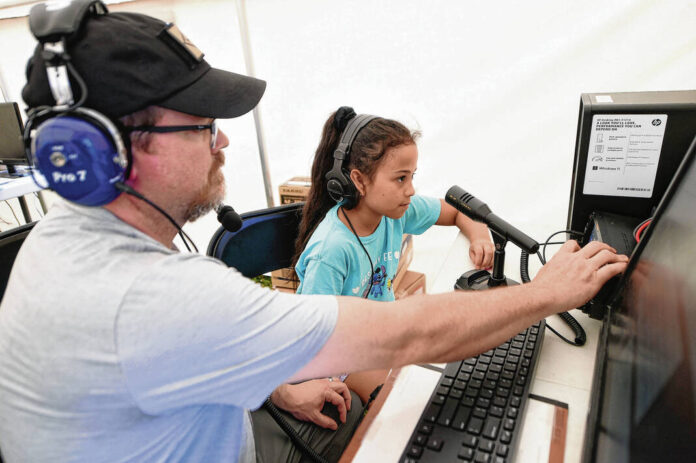
Simon Padgett, left, helps instructs his daughter, Mia, 9, how to operate a radio. Hancock Amateur Radio Club had its annual meeting on Saturday, June 25 and Sunday, June 26, at St. Michael Catholic Church. Starting at 2 p.m. June 25 for a 24-hour period, under the pretense of a Simulated Emergency Situation, they conducted this year’s annual National Field Day training exercise along with other Amateur Radio groups throughout the USA and Canada. Saturday, June 25, 2022.
GREENFIELD — Two large antennas standing tall, some 35 to 40 feet high, pointed into the sky and were positioned on both sides of a large, tan tent. Another amateur radio satellite antenna sat on the backside of the area in the grassy field just behind the parish offices at St. Michael Catholic Church.
Sitting inside the tent, amateur radio operator Larry Card was tapping, hard at work on the Morse Code machine while across the tent amateur radio operator Simon Padgett sat at another makeshift desk slowly searching the air waves on a more advanced communication form. He was trying to make a voice connection via the radio with a microphone.
Both men, and several other members of the Hancock Amateur Radio Club (HARC) were trying to reach other amateur radio operators throughout the United States and Canada during the Amateur Radio National Field Day event Saturday.
The event lasted 24 hours from 2 p.m. Saturday to 2 p.m. Sunday and was an exercise for amateur radio operators all across the U.S. to connect with others who were looking to assess team skills and abilities while also earning points for every digital, voice or Morse Code connection. The top club or person gets a mention in a nationwide amateur radio magazine.
Jon Reeves is the president of the HARC, over 30 members strong, and said the work they do during field day could help make a difference in the event of a major catastrophe. While he noted Indiana doesn’t have to worry about things like a hurricane, the state is susceptible to tornadoes, or an earthquake, or it could be hit with an electromagnetic pulse — all things that might destroy communications.
“The club is important and the exercise is important because we would be providing communications around town, around the county, the state or even around the world should the internet or normal communications ever go down,” Reeves said.
Coming off of the pandemic, Reeves noted there is a real fear of disasters in the world, and if one should happen locally, the experience HARC members get during an event like field day would come in handy.
“This is a major event for us each year,” Reeves said. “This is a hobby, but it’s also for emergencies.”
Deputy director for the Hancock County Homeland Security team, Joe Fitzgerald stopped by to check out the operations and thanked the club for always working to be prepared in the event of a local disaster.
“We appreciate what this club does,” Fitzgerald said. “We would rely on them heavily in the event of a major disaster, and we consider them an integral part of our agency.”
While some participants will operate on their own in what is called a Parks on the Air (POTA) operation where they set up a portable system in a National Park and just start communicating, the county’s amateur radio club members enjoy working together on field day.
Jeff Emminger, New Palestine, has been a HARC member for close to 20 years. While he is not as active on the radio as most members, he likes field day because he can get out and make connections.
“If there is ever a disaster in the area, you can bet the amateur radio operators will be some of the first ones up and running,” Emminger said.
He said the club recently received a $10,000 safety grant which allowed them to purchase better equipment and the tent they set their operations up in, helping give them a top-notch club.
Stephen Jordan, Greenfield, has been a HARC member since 2000. He likes making contact with other operators from all over the U.S. He said it’s important to test their emergency preparedness skills and spent much of the 24-hour event helping log contacts into a computer.
“I then take the log files and compile everything and submit our results,” Jordan said.
Rick Rogers, an amateur radio operator from Arizona, hooked up with the local club while in town visiting relatives. He observed the HARC operations and said the local club is a first-class team and is run well by members who take the hobby seriously.
“Amateur radio is not like it used to be where you just show up and start communicating,” Rogers said.
Rogers, who has an amateur radio and works for the American Red Cross in Arizona, planned to find an open spot during the 24-hour event and make some connections for the local club. He noted there are proper steps to follow for amateur radio operators and events like field day give them a chance to work on those skills.
“The purpose of field day is an opportunity for training and for clubs to bring out all of their equipment and to see how things are going to go down should a real emergency arise,” Rogers said.

